
Bruce Perens is an American computer programmer and advocate in the free software movement. He created The Open Source Definition and published the first formal announcement and manifesto of open source. He co-founded the Open Source Initiative (OSI) with Eric S. Raymond.

StarOffice is a discontinued proprietary office suite. Its source code continues today in derived open-source office suites Collabora Online and LibreOffice. StarOffice supported the OpenOffice.org XML file format, as well as the OpenDocument standard, and could generate PDF and Flash formats. It included templates, a macro recorder, and a software development kit (SDK).

Linux Australia is the national, Australian Free and Open Source Software Community organisation. It was founded in 1997 and formally incorporated in New South Wales as a non-profit organisation in 1999. Linux Australia aims to represent Australian Free and Open Source Software communities and to support and collaborate with related groups, including Linux User Groups in Australia.

COMDEX was a computer expo trade show held in the Las Vegas Valley of Nevada, United States, each November from 1979 to 2003. It was one of the largest computer trade shows in the world, usually second only to the German CeBIT, and one of the largest trade shows in any industry sector. COMDEX exhibitions were held in many other countries from 1982 to 2005, with 185 shows altogether. The first COMDEX was held in 1979 at the MGM Grand, with 167 exhibitors and 3904 attendees. In 1981, the first COMDEX/Spring was held in New York City.
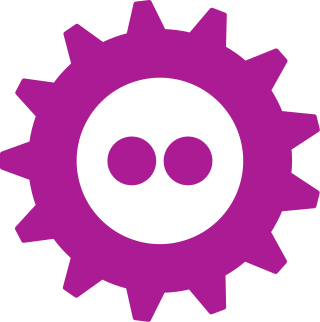
Free and Open source Software Developers' European Meeting (FOSDEM) is a non-commercial, volunteer-organized European event centered on free and open-source software development. It is aimed at developers and anyone interested in the free and open-source software movement. It aims to enable developers to meet and to promote the awareness and use of free and open-source software.
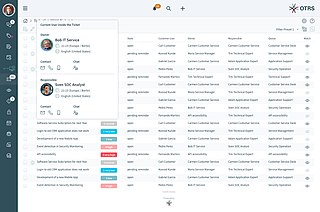
OTRS is a service management suite. The suite contains an agent portal, admin dashboard and customer portal. In the agent portal, teams process tickets and requests from customers. There are various ways in which this information, as well as customer and related data can be viewed. As the name implies, the admin dashboard allows system administrators to manage the system: Options are many, but include roles and groups, process automation, channel integration, and CMDB/database options. The third component, the customer portal, is much like a customizable webpage where information can be shared with customers and requests can be tracked on the customer side.

Jon "maddog" Hall is the board chair for the Linux Professional Institute.

LinuxWorld Conference and Expo was a conference and trade show that focused on open source and Linux solutions in the information technology sector. It ran from 1998 to 2009, in venues around the world.
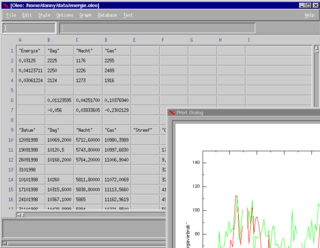
GNU Oleo is a discontinued lightweight free software spreadsheet originally designed as a text-based spreadsheet using the curses library. The last development version of Oleo, 1.99.16, was released in 2001.

RadioTux is a German internet radio show. The topics are mostly around free and open source software, free operating systems like *BSD and Linux, as well as on sociopolitical issues. It was founded in 2001.
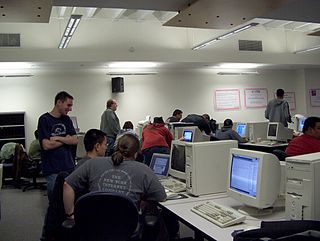
A Linux User Group or Linux Users' Group (LUG) or GNU/Linux User Group (GLUG) is a private, generally non-profit or not-for-profit organization that provides support and/or education for Linux users, particularly for inexperienced users. The term commonly refers to local groups that meet in person but is also used to refer to online support groups that may have members spread over a very wide area and that do not organize, or are not dependent on, physical meetings. Many LUGs encompass FreeBSD and other free-software / open source Unix-based operating systems.

Free Society Conference and Nordic Summit (FSCONS) is a Nordic conference trying to bridge the gap between software and cultural freedom held each autumn in Gothenburg, Sweden. It shares many similarities with FOSDEM in the way in which the event is structured, but where the latter attracts speakers and visitors primarily interested in Free software, FSCONS aims to attract a more diverse crowd. The conference was organised 2007-2011 by FFKP, the Society for Free Culture and Software. In 2012, a new member run association was formed to take over the organisation of conference.
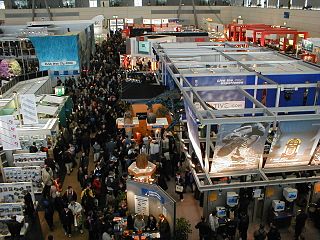
CeBIT was a computer expo which, at its peak, was the largest and most internationally representative. The trade fair was held each year on the Hanover fairground, the world's largest fairground, in Hanover, Germany. In its day, it was considered a barometer of current trends and a measure of the state of the art in information technology. It was organized by Deutsche Messe AG.

The Open Source Business Alliance - Bundesverband für digitale Souveränität e.V. (OSBA) is a German non-profit that operates Europe's biggest network of companies and organizations developing, building and using open source software.

Puddletag is a graphical audio file metadata editor ("tagger") for Unix-like operating systems.

Kid3 is an open-source cross-platform audio tag editor for many audio file formats. It supports DSF, MP3, Ogg, FLAC, MPC, MPEG-4 (mp4/m4a/m4b), AAC, Opus, SPX, TrueAudio, APE, WavPack, WMA, WAV, AIFF, tracker modules.

Open Source Day is an international conference gathering fans of open solutions from Central and Eastern Europe. Mission of the event is to introduce open source solutions to Polish public and business institutions and popularize it as a secure, efficient, cost saving alternative to proprietary software. The conference has taken place in Warsaw since its beginning in 2007. Participants are mainly managers, developers, technical officers of public, banking, and insurance industries.

SCO Forum was a technical computer conference sponsored by the Santa Cruz Operation (SCO), briefly by Caldera International, and later The SCO Group that took place during the 1980s through 2000s. It was held annually, most often in August of each year, and typically lasted for much of a week. From 1987 through 2001 it was held in Santa Cruz, California, on the campus of the University of California, Santa Cruz. The scenic location, amongst redwood trees and overlooking Monterey Bay, was considered one of the major features of the conference. From 2002 through 2008 it was held in Las Vegas, Nevada, at one of several hotels on the Las Vegas Strip. Despite the name and location changes, the conference was considered to be the same entity, with both the company and attendees including all instances in their counts of how many ones they had been to.

The Chemnitz Linux Days, are an annual event focusing on Linux and free (libre) software in general. It takes place in the auditory and seminar building of Chemnitz University of Technology in the federal state of Saxony, in the south-east of Germany. There are talks, project booths, workshops, install parties, child care and playful educational lectures for the younger visitors, as well as technical help desks. Both talks and workshops are held in German; some are also held in English, and they cover a broad variety of topics for professionals as well as entry-level visitors.























